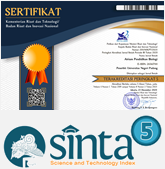SCHOOLOGY VALIDITY VALUE AS A LEARNING SUPLEMENT IN THE MOVEMENT SYSTEM MATERIAL FOR 2ND SENIOR HIGH SCHOOL
Abstract
Keywords
Full Text:
FullpaperReferences
Afriadi, R. Lufri. 2013. Pengembangan Modul Biologi Bermuatan Pendidikan Karakter pada Materi Sistem Reproduksi Manusia Kelas XI SMA. E-jurnal Universitas Negeri Padang. 1 (2), 1-12.
Arsyad, A. 2010. Media Pembelajaran. Jakarta: PT. Raja Grafindo Persada.
Darmawan, D. 2014. Pengembangan E-learning Teori dan Desain. Bandung: PT. Remaja Rosdakarya.
Depdiknas. 2008. Panduan Pengembangan Bahan Ajar. Jakarta: Direktorat Jenderal Manajemen Pendidikan Dasar dan Menengah.
Hourdequin, P. 2014. Edmodo: A Simple Tool for Blended Learning. London: The Language Teacher 38.
Jaykumar, L. N. K. 2014. Student Prefence Towards The Use of Edmodo As A Learning Environment. Asia Euro Conference prosiding. Selangor: School of Hospitality, Tourism and Culinary Arts, Taylor’s University.
Lufri. 2003. Pemecahan Masalah dalam Konteks Pembelajaran Biologi. Jurnal Bioedukasi. 1 (2), 1-10.
Munir. 2009. Pembelajaran Jarak Jauh Berbasis Teknologi Informasi dan Kominukasi. Bandung: Alfabeta.
Purwanto, N. 2009. Prinsip-Prinsip dan Teknik Evaluasi Pengajaran. Bandung: Remaja Rosdakarya.
Restiani, R. 2014. Profil Pemanfaatan Teknologi Informasi dan Komunikasi sebagai Media dan Sumber Pembelajaran oleh Guru Biologi. Jurnal EDUSAINS, 4 (1), 1-12.
Riduwan. 2012. Pengantar Statistika Sosial. Bandung: Alfabeta.
Rohmah, L. 2016. Konsep E-learning dan Aplikasinya Pada Lembaga Pendidikan Islam. Jurnal An-Nur, 3 (2), 1-11.
Sanaky, P. 2013. Pengembangan Media Pembelajan E-learning Berbasis Edmodo. Jurnal Pendidikan Teknik Elektro.
Sukiman. 2012. Pengembangan Media Pembelajaran. Yogyakarta: Pedagogia.
Trisnawati, F. 2017. Keefektifan Media Edmodo Sebagai Penunjang Pembelajaran Teknologi Informasi & Komunikasi di Sekolah Menengah Pertama. Journal of Curriculum and Educational TechnologyStudies, 5 (1), 42-48.
DOI: http://dx.doi.org/10.24036/apb.v6i2.7655
DOI (Fullpaper): http://dx.doi.org/10.24036/apb.v6i2.7655.g4696




